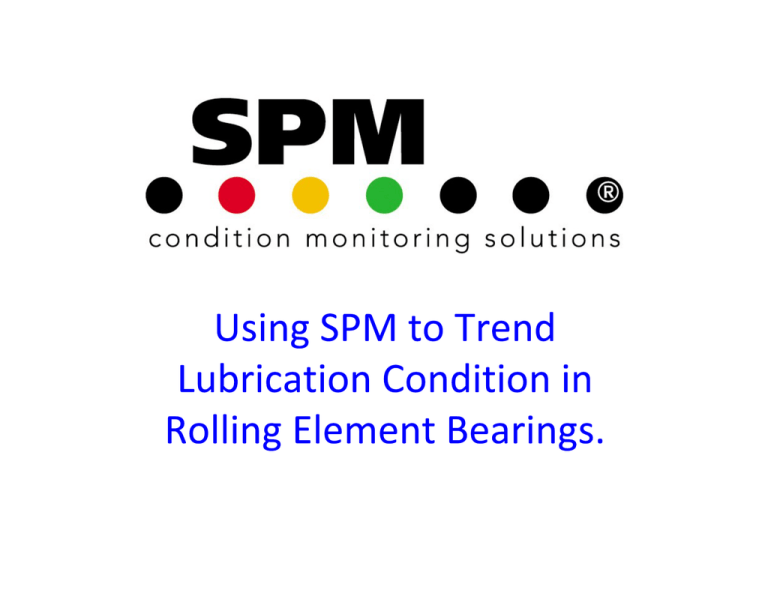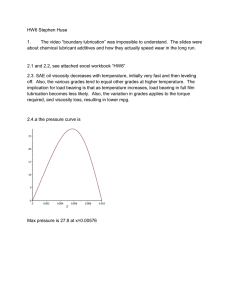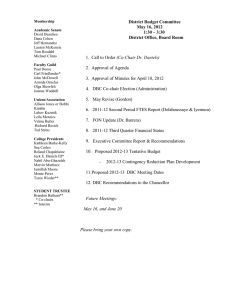The True Shock Pulse Method for Lubrication Condition Monitoring
advertisement

Shock Pulses Resonance Frequency Peaks around the resonant frequency Unbalance 0.05 0 0 5000 4 1 .10 4 1.5 .10 4 2 .10 Hz 4 2.5 .10 4 3 .10 4 3.5 .10 4 4 .10 Shock Pulse Transducer Trancients Resonance 2 0 Bearing damage 2 0 0.005 0.01 0.015 Unbalance 0.02 0.025 0.03 Unbalance 0.035 n 0.6 0.4 Bearing damage 0.2 0 0 100 200 300 400 500 Hz 600 700 800 900 1000 Enveloping at a Resonance Frequency 2 0 2 0 0.005 0.01 0.015 0.02 0.025 0.03 Peaks the the Peaksaround around resonans frequency resonant frequency Unbalance 0.05 0 0 5000 Band pass filter 0.035 4 1 10 4 1.5 10 4 2 10 Hz 4 2.5 10 4 3 10 4 3.5 10 4 4 10 0.1 0 0.1 Signal after band pass filter 0.1 After rectifying .01 After enveloping Peak detection 0 2 0 Bearing damage 2 0 0.005 0.01 0.015 0.02 0.025 0.03 0.035 Bearing damage 0.1 0 0.1 0 I. Time domain (SPM) II. Frequency domain dBm 0.1 dBc 0 Hz dBc dBc The dBc value is effected by the lubrication condition in a bearing. It is commonly referred to as the background noise or the carpet noise of a bearing. The dBc value is calculated by sampling the incoming signal about a 1000/sec an average of all the lower Shock Pulses. Full film lubrication Partial lubrication Boundary lubrication Static and dynamic load Preload Lubricant type Lubricant supply Alignment Properly sized shaft and housing fits Geometric quality of bearing Temperature Viscosity Total load Rolling velocity Things that effect the Lubricant film thickness Surface finish Contaminants in Lubricant film Cleanliness dBm dBc The dBm value is calculated by sampling the incoming signal approximately 50/ sec an average of all the stronger Shock Pulses. The dBm value indicates the bearing operating condition once a measurement is completed. The dBm is commonly referred to as the Max value On the Infinity, the LED s and the color coded dots to the left of the measuring results indicate the operating condition. dBm dBc SPM Evaluation Scale dBsv 100 dBn 60 51 dbm 33 dbc dbi 15 -9 Normalized measuring scale: dBsv = dBn + dBi 36 dbm 18 dbc 0 Time This becomes the starting point for the 0 60 Green Yellow - Red scale. The dBi value is calculated once the RPM and Shaft Diameter have been input into the instrument or software. Bearing Operating Condition: Red Yellow Green - Bad (dBm 35 and more) - Caution (dBm 21 to 34) - Good (dBm up to 20) SPM recommends changing the bearing when dBm reaches 55 1 2 3 Low dBm/dBc readings with small delta indicates a good bearing Small delta with elevated dBm/dBc readings typically indicate lubrication problems Large delta (15 or >) with elevated dBm/dBc readings indicate possible bearing damage or other mechanical problems SPM dbm/ dbc trend graph Bearing replaced Bearing Lubricated because dbc reading increased it also drove up the dbm. Signal Source? Is the Red or Yellow SPM Reading from the bearing or outside source? SPM Spectrum used to confirm bearing and lubrication concerns Add bearing coefficients in software to utilize Bearing Symptom feature SPM Spectrum with Bearing Symptom in software Bearing Symptom matches up with FTF in this example confirming bearing damage.

